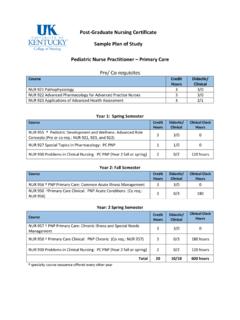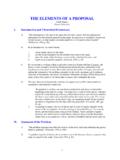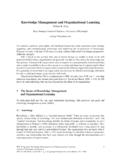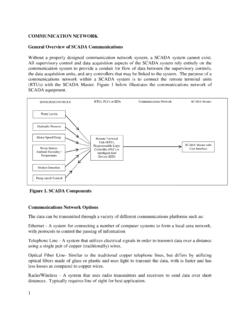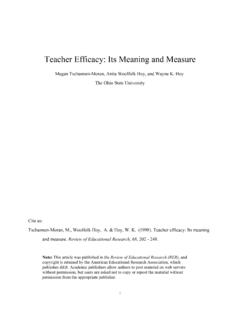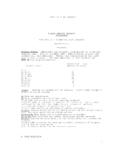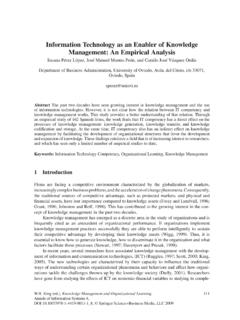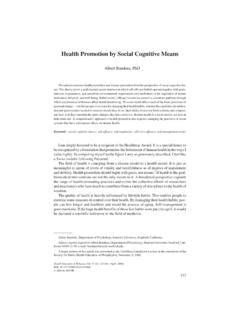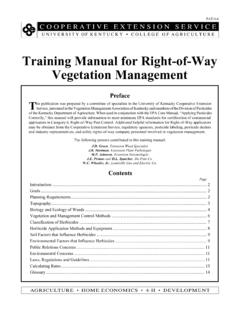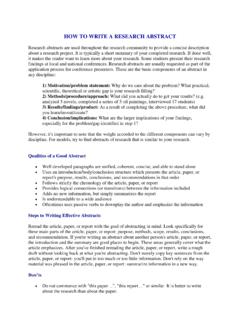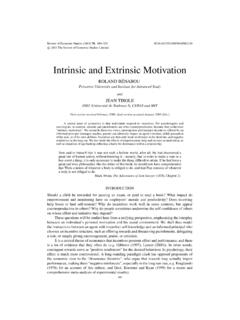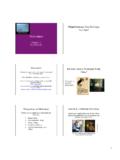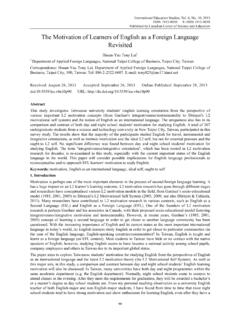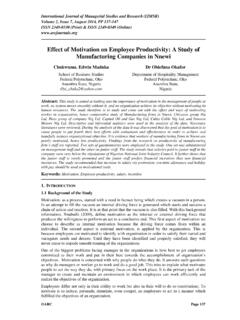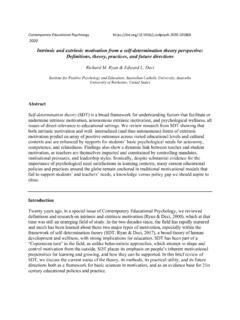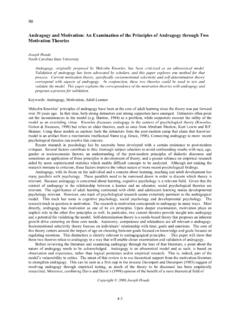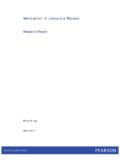Transcription of Self-Efficacy
1 1 self -EfficacyAlbert BanduraStanford UniversityBandura, A. (1994). Self-Efficacy . In V. S. Ramachaudran (Ed.), Encyclopedia of humanbehavior (Vol. 4, pp. 71-81). New York: Academic Press. (Reprinted in H. Friedman[Ed.], Encyclopedia of mental health. San Diego: Academic Press, 1998).2 of Self-Efficacy Beliefs Benefits of Optimistic self -Beliefs of and Exercise of Self-Efficacy Over the LifespanGlossaryAffective Processes: Processes regulating emotional states and elicitation of emotional Processes: Thinking processes involved in the acquisition, organization and use : Activation to action. Level of motivation is reflected in choice of courses of action, and inthe intensity and persistence of Self-Efficacy : People's beliefs about their capabilities to produce : Exercise of influence over one's own motivation , thought processes, emotional statesand patterns of Self-Efficacy is defined as people's beliefs about their capabilities to producedesignated levels of performance that exercise influence over events that affect their lives.
2 Self-Efficacy beliefs determine how people feel, think, motivate themselves and behave. Such beliefsproduce these diverse effects through four major processes. They include cognitive,motivational, affective and selection strong sense of efficacy enhances human accomplishment and personal well-being inmany ways. People with high assurance in their capabilities approach difficult tasks aschallenges to be mastered rather than as threats to be avoided. Such an efficacious outlookfosters intrinsic interest and deep engrossment in activities. They set themselves challenginggoals and maintain strong commitment to them. They heighten and sustain their efforts in theface of failure. They quickly recover their sense of efficacy after failures or setbacks. Theyattribute failure to insufficient effort or deficient knowledge and skills which are approach threatening situations with assurance that they can exercise control over an efficacious outlook produces personal accomplishments, reduces stress and lowersvulnerability to contrast, people who doubt their capabilities shy away from difficult tasks which theyview as personal threats.
3 They have low aspirations and weak commitment to the goals theychoose to pursue. When faced with difficult tasks, they dwell on their personal deficiencies, onthe obstacles they will encounter, and all kinds of adverse outcomes rather than concentrate onhow to perform successfully. They slacken their efforts and give up quickly in the face ofdifficulties. They are slow to recover their sense of efficacy following failure or they view insufficient performance as deficient aptitude it does not require much failurefor them to lose faith in their capabilities. They fall easy victim to stress and Sources of self -EfficacyPeople's beliefs about their efficacy can be developed by four main sources of most effective way of creating a strong sense of efficacy is through mastery build a robust belief in one's personal efficacy .
4 Failures undermine it, especially iffailures occur before a sense of efficacy is firmly people experience only easy successes they come to expect quick results and are easilydiscouraged by failure. A resilient sense of efficacy requires experience in overcoming obstacles3through perseverant effort. Some setbacks and difficulties in human pursuits serve a usefulpurpose in teaching that success usually requires sustained effort. After people becomeconvinced they have what it takes to succeed, they persevere in the face of adversity and quicklyrebound from setbacks. By sticking it out through tough times, they emerge stronger second way of creating and strengthening self -beliefs of efficacy is through thevicarious experiences provided by social models. Seeing people similar to oneself succeed bysustained effort raises observers' beliefs that they too possess the capabilities master comparableactivities to succeed.
5 By the same token, observing others' fail despite high effort lowersobservers' judgments of their own efficacy and undermines their efforts. The impact of modelingon perceived Self-Efficacy is strongly influenced by perceived similarity to the models. Thegreater the assumed similarity the more persuasive are the models' successes and failures. Ifpeople see the models as very different from themselves their perceived Self-Efficacy is not muchinfluenced by the models' behavior and the results its influences do more than provide a social standard against which to judge one'sown capabilities. People seek proficient models who possess the competencies to which theyaspire. Through their behavior and expressed ways of thinking, competent models transmitknowledge and teach observers effective skills and strategies for managing environmentaldemands.
6 Acquisition of better means raises perceived persuasion is a third way of strengthening people's beliefs that they have what ittakes to succeed. People who are persuaded verbally that they possess the capabilities to mastergiven activities are likely to mobilize greater effort and sustain it than if they harbor self -doubtsand dwell on personal deficiencies when problems arise. To the extent that persuasive boosts inperceived Self-Efficacy lead people to try hard enough to succeed, they promote development ofskills and a sense of personal is more difficult to instill high beliefs of personal efficacy by social persuasion alonethan to undermine it. Unrealistic boosts in efficacy are quickly disconfirmed by disappointingresults of one's efforts. But people who have been persuaded that they lack capabilities tend toavoid challenging activities that cultivate potentialities and give up quickly in the face ofdifficulties.
7 By constricting activities and undermining motivation , disbelief in one's capabilitiescreates its own behavioral efficacy builders do more than convey positive appraisals. In addition toraising people's beliefs in their capabilities, they structure situations for them in ways that bringsuccess and avoid placing people in situations prematurely where they are likely to fail measure success in terms of self -improvement rather than by triumphs over also rely partly on their somatic and emotional states in judging their interpret their stress reactions and tension as signs of vulnerability to poor performance. Inactivities involving strength and stamina, people judge their fatigue, aches and pains as signs ofphysical debility. Mood also affects people's judgments of their personal efficacy .
8 Positive moodenhances perceived Self-Efficacy , despondent mood diminishes it. The fourth way of modifyingself-beliefs of efficacy is to reduce people's stress reactions and alter their negative emotionalproclivities and misinterpretations of their physical is not the sheer intensity of emotional and physical reactions that is important butrather how they are perceived and interpreted. People who have a high sense of efficacy arelikely to view their state of affective arousal as an energizing facilitator of performance, whereasthose who are beset by self - doubts regard their arousal as a debilitator. Physiological indicators4of efficacy play an especially influential role in health functioning and in athletic and otherphysical efficacy -Activated ProcessesMuch research has been conducted on the four major psychological processes through whichself-beliefs of efficacy affect human Cognitive ProcessesThe effects of Self-Efficacy beliefs on cognitive processes take a variety of forms.
9 Muchhuman behavior, being purposive, is regulated by forethought embodying valued goals. Personalgoal setting is influenced by self -appraisal of capabilities. The stronger the perceived Self-Efficacy , the higher the goal challenges people set for themselves and the firmer is theircommitment to courses of action are initially organized in thought. People's beliefs in their efficacyshape the types of anticipatory scenarios they construct and rehearse. Those who have a highsense of efficacy , visualize success scenarios that provide positive guides and supports forperformance. Those who doubt their efficacy , visualize failure scenarios and dwell on the manythings that can go wrong. It is difficult to achieve much while fighting major function of thought is to enable people to predict events and to develop ways tocontrol those that affect their lives.
10 Such skills require effective cognitive processing ofinformation that contains many ambiguities and uncertainties. In learning predictive andregulative rules people must draw on their knowledge to construct options, to weight andintegrate predictive factors, to test and revise their judgments against the immediate and distalresults of their actions, and to remember which factors they had tested and how well they requires a strong sense of efficacy to remain task oriented in the face of pressingsituational demands, failures and setbacks that have significant repercussions. Indeed, whenpeople are faced with the tasks of managing difficult environmental demands under taxingcircumstances, those who are beset by self -doubts about their efficacy become more and moreerratic in their analytic thinking, lower their aspirations and the quality of their performancedeteriorates.
